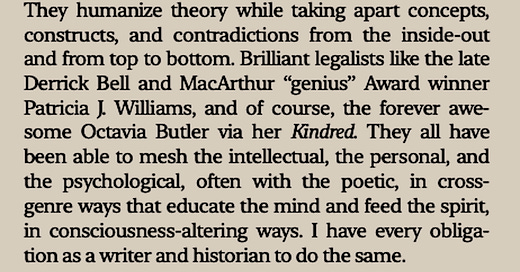We are seven (7) days away from the debut of Spinning Sage’s Gold — huzzah! I wanted to begin the glide path into the book with a excerpt from the Preface, about why I chose to take a cross-genre, allegorical approach to Spinning Sage’s Gold, all with critical race theory front and center. I cover quite a bit of the why in my audio recording explaining my love for the late Derrick Bell’s work (along with Patricia J. Williams, Richard Delgado, and yes, Octavia Butler, too).
But what I didn’t cover was the writing process itself. I started working on this project when I had originally titled it Narcissism, American Style, back in November 2016. Heck, for the first three years or so, I didn’t even call it a book. It was to be a series of strictly general-audience, nonfiction essays about the relationship between American narcissism and American racism in historical and contemporary relief. By the summer of 2017, I had published some of those essays in Al Jazeera, in HuffPost, and on Medium. At least two lit agents wrote to me at the time that they couldn’t sell a book of already published essays (I know, right? They sell these books all the time — liars!). By the end of 2018, though, I was having more success publishing my would-be essay collection through news outlets and their opinion and big-idea pages than getting any agent to rep me for the collection.
And that’s when I realized. Every seriously thoughtful writer and intellectual on the US and the West has recognized the nearly inevitable decline of the US and the West under their own weight. Some, like me, believe that this decline will turn into a violent collapse, even a total implosion, one that could threaten all life on the planet.
That’s fairly easy to write, but it’s also as depressing as a muthafucka. I decided then that I would and could go deeper, to think about the possibility that the US’ and the West’s collapse wouldn’t be the end, but a new beginning. I decided to go to the historian’s no-no, the future, to think about what my post-Western descendants (whether by blood, by adoption, or by spirit) would think about the last centuries of Western and US dominance.
That’s when I decided to go back to Bell, and Williams, and Butler, and others, who have speculated through allegory about the past, the present, and the future of endemic American racism. Yet I went one extra step further. I thought about meshing the essays I had published and the essay I had been working on with wisps of a speculative future, one where our real-life past and present connected with it. For me, the answer was easy — the mindscape. If DNA contains the memories of our ancestors, and dreams and visions allow us to see our past, and possibly the future, I could at least provide realistic alternative timelines adding up to a possible future. I’m sure that’s how authors like Bell, Williams, and Butler must’ve seen things when their writings were in the development stage.
Not everybody likes a cross-genre, bedrock-reality-meets-better-if-speculative-future essay series, especially on something as deadly as systemic racism and collective Western narcissism. And that’s fine. I recognize that Spinning Sage’s Gold will be a book that readers will either like/love or loathe/hate — there won’t be many in the middle. But the thread of critical race theory should be as apparent as sunshine in the Sahara on a clear, low-dust day.








Share this post